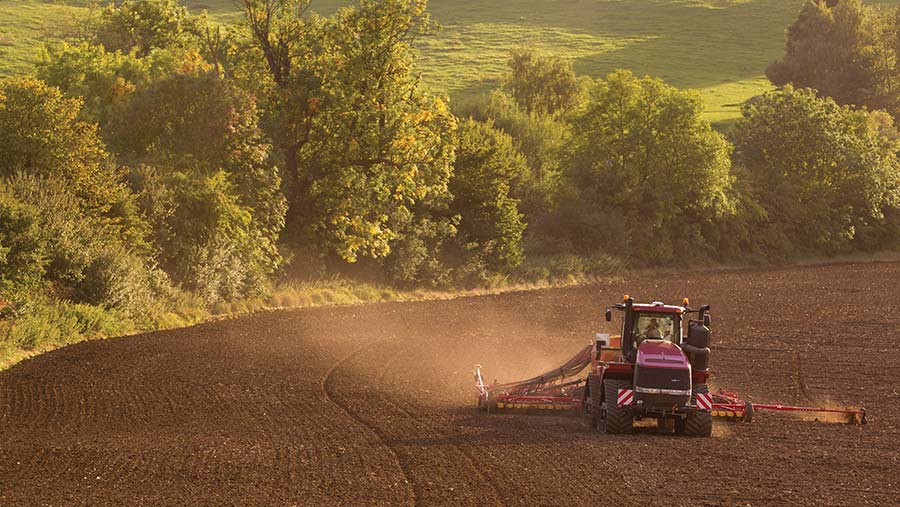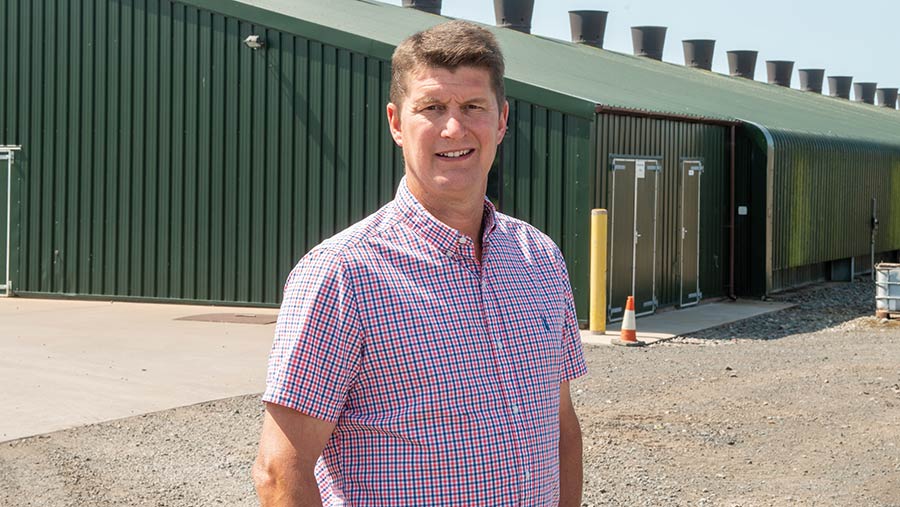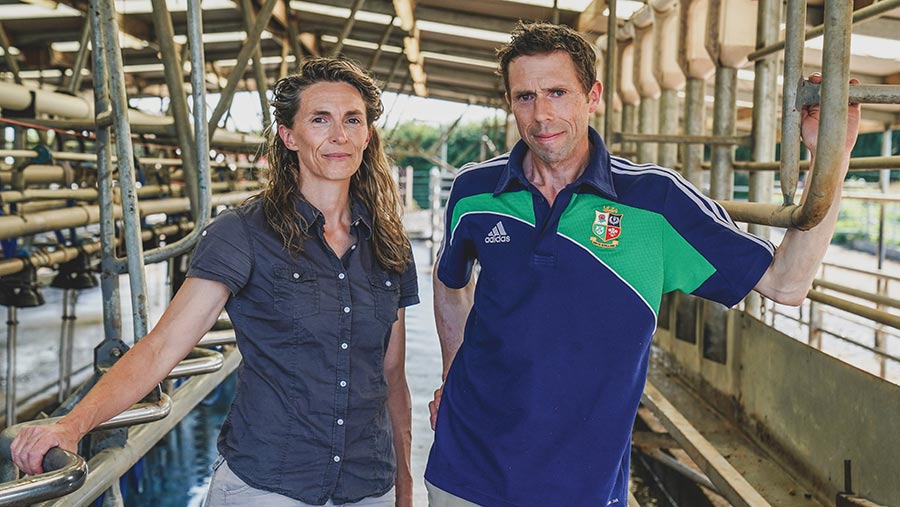Considering a new future: Ways to deal with farming pressures
 © Tim Scrivener
© Tim Scrivener It is no secret that stress and poor mental health are endemic among the people who make their living from the land.
As the UK moves away from direct farm payments to other kinds of funding, another tier of pressure has been added, with many questioning their future as active farmers.
Responses to the Farmers Weekly Transition survey earlier this year confirmed this, with 87.5% of farmers polled uncertain whether their farms would survive without Basic Payment Scheme (BPS) support.
See also: How two dairy farms achieved a better work-life balance
Even before the changes to farm support policies, levels of mental ill health were high among farmers, says Matt Lobley, professor of rural resource management at the University of Exeter.
The transition has created yet another stressor.
“It is taking so long for all the details of the new schemes to come out and farmers are having to make important decisions for the future of their businesses without having that full information.
“There is no question that some will have quite significant financial worries,” says Matt.
“In fairness to Defra they couldn’t have changed everything at once, it had to be a staged approach, but that doesn’t help farmers.”
Add high input costs, stagnant commodity values, relatively high interest rates and labour shortages to the mix and the pressure on some businesses is acute.
Considering a different role or structure
Richard Wordsworth, NFU senior adviser for support schemes, says it is clear that some farmers will need to take a different path in future. Some will continue as before, implementing no changes.
For others changing business structure might be the answer, while some will exit the industry.
Richard suggests there is another option that farmers should also consider.
“Instead of continuing as an active farmer, he or she might take a different role in the sector, be that as a contractor, mentor, freelance worker, diversifying into a hobby, renting out the farm or share farming.”
Pursuing one or more of these pathways could help farmers navigate their way through the challenges ahead, achieve a better work-life balance and, critically, improve their mental health.
The farming sector will also gain, by retaining valuable expertise. Taking this route should never been seen as a failure to farm, insists Richard, but “a way to enjoy life and be involved in the great industry we are connected to”.
Approaching change in a structured, timely and positive way while reassessing work-life balance is not only good for the wellbeing of the business, but for the people involved as well.
So what to consider?
Tax implications
Making an honest assessment of workloads, staffing levels, mental and physical fitness and the needs of family is a good place to start.
George Chichester, a director at Strutt & Parker, says there are a number of possible permutations of the paths farmers can take, but each needs careful consideration to understand the full implications of any change.
“Perhaps the most important starting point is to consider the tax implications of change, though all too often this is the last thing that gets thought about,” George says.
“A working farm status is perhaps the best tax structure possible, delivering inheritance, capital gains, income tax and VAT concessions.”
Even a change from full in-hand farming to using contractors will have tax implications, triggering profit on sale of machinery and equipment, therefore professional advice should be sought before decisions are made.
Tenants and employees
For a tenant farmer, George recommends scrutinising the terms of the tenancy agreement, to establish if there are restrictions, such as with cropping, occupation of dwellings, or sub-lettings.
Effects on people from reducing the scale of operations needs full consideration too as it is likely to mean changes for employees or family labour.
“If this leads to a redundancy situation one needs to ensure that there is no risk of unfair dismissal due to the employee’s duties being taken over by another, for example an employee of a contractor,” George warns.
“The employee can easily become an innocent victim in such situations and it is important to protect them as best as possible for both legal and ethical reasons.
“There are moral and mental responsibilities here, in addition to financial considerations.”
There might also be consequences for housing if an employee’s home is in farm accommodation.
If there is no written agreement between the employee and employer an Assured Agricultural Occupancy is likely to have been created, which means that under the Housing Act the worker has a contractual right to stay in the house, even if they are no longer employed by the business.
The ability to remove the worker from the accommodation is limited, although it may be possible to charge a market rent.
Leaving the industry
The most viable route for some farmers could be to cease farming, a process which requires careful management and planning. An exit pathway is possible for all farm types.
For farmers with a successor, handing over control and retiring from the business is the most common route.
This comes with practical challenges such as housing, pensions, and supporting other generations associated with this, therefore good succession planning is necessary.
When there is no successor, a farm owner might choose to rent out the land while continuing to live in the farmhouse, although by not occupying the land they will lose inheritance tax (IHT) relief on the house.
Land let under a farm business tenancy will qualify for agricultural property relief, but will not qualify for business property relief, so any value above agricultural value will not receive IHT relief.
It will however provide a release of capital and a guaranteed income with negligible risk if a good tenant is chosen, says George.
He advises careful drafting of clauses within the tenancy agreement to mitigate loss of tax advantages and to ensure some ongoing control over the land.
For farmers who are tenants, liquidating capital invested in the business will provide some cash for retirement.
Another option for farmers who no longer want to actively farm, or who want to reduce effort and stress, is to introduce new entrants through a variety of alternative arrangements such as joint ventures, contract farming or share farming.
Joint ventures can help businesses grow through the injection of different skills and resources.
In Wales, Farming Connect’s Start to Farm initiative can pair landowners who are looking to step back from the industry with new entrants, and provide funding for business planning and legal guidance.
In Scotland, the Scottish Land Matching Service will facilitate pathways to collaboration.
Retaining links and input with farming
If a farmer is planning to leave the industry, an important consideration which is often overlooked is how they will fill their time.
“Retirement can be quite a shock for a farmer after a lifetime of graft,” says George.
Farming provides a deep sense of personal identity and meaning, therefore exiting it completely can create mental health and wellbeing challenges
For some, transitioning from one business structure to another through joint ventures allows that important link to be retained.
The type of farming system will have a bearing on how easily changes can be made. As George points out, a livestock farm with its multi-annual cycle needs year-round attention and a minimum of two people to handle stock.
A variant of this might see the farmer managing the farm’s grassland and fences with a third party bringing grazing livestock onto the land.
George thinks it is sensible for a farmer to work with the same grazier every year, as once the agreement is in place it can be easily replicated year after year.
Shifting the business focus to farming within environmental schemes is another option.
These are relatively inexpensive to deliver, involve less risk and effectively guarantee an income irrespective of weather or markets.
In extreme cases, farmers are putting the entire farm into stewardship, says George.
“This is a dramatic decision, but in some cases understandable, though the long-term implications, particularly on the capital value of the land asset, are often overlooked and the tax implications are not entirely clear.”
Increasingly, farmers are also exploring different roles within the industry, either by acting as a mentor or taking up a full- or part-time freelance-related role such as adviser or consultant.
This provides the opportunity for skills and expertise that a farmer has developed over their career, to be used in a way which provides a steady and more predictable income and more regulated hours of commitment.
For example, in Wales, farmers are involved in Farming Connect’s new mentoring scheme, to give guidance and advice to others. Nationally corporate programmes such as the Tesco Future Farmer Foundation also require peer mentors.
Transition Farmer: Vaughan Hodgson

Vaughan Hodgson © Hugh Nutt
Retirement planning is a work in progress for 54-year-old Cumbrian poultry producer Vaughan Hodgson, with it reviewed annually within the business accounts.
Pension contributions for all family members are confirmed before the end of each tax year.
Vaughan, a partner in JG & DE Hodgson and director of Hodgson Poultry at Kirkbride, near Wigton, farms with his wife, Sandra, and two of their children, both of whom want to continue farming and expand the business.
The couple have “reasonable” self-investment pension provision (Sipp) and external investments outside the business to enable some retirement planning.
“However this still requires more funding in the upcoming years to enable us to be more independent from the farm in our retirement,” says Vaughan.
“Our accountant will guide us through this process to achieve the desired outcome.”
One area the Hodgsons will need to address is where they will live when they step back from the business. “We are comfortable that this can be achieved with careful planning in the near future,” says Vaughan.
Transition Farmers: Rachel and Richard Risdon

Rachel and Richard Risdon © Emily Fleur
Tenant farmers Rachel and Richard Risdon have almost reached the midway point in their 20-year farm business tenancy.
Although their landlord has indicated he is likely to extend that agreement once it is beyond the halfway point, there is still concern about unknowns that may lie ahead.
With their children aged just 13 and 11, succession planning isn’t directly relevant yet, but with that next generation in mind, Rachel says a better mechanism is needed for passing on farms to keen new entrants.
That mechanism should work for both parties in a similar way to the traditional father-to-son model, enabling older farmers to gradually phase out their farming activities while supporting and encouraging a new entrant.
For the Risdons, it had been challenging to secure a tenancy despite Richard having farming experience and a good track record with the bank and Rachel being a qualified farm vet.
“This has always made us keen to take on a second tenancy in a joint venture with someone else, to give them a leg up into the industry,” says Rachel.
“We get on really well with our herd manager who joined us just prior to covid and became part of our family, eating with us every weekend during lockdowns, and so we are looking hard for that opportunity now.”
Rachel suggests there could be many more opportunities for people in their position if other farmers were able to leave the industry more easily.
“Many hang on, often reducing the workload from dairy to beef or forage, and sadly often not really maintaining what they have properly.
“These farmers don’t want to rent out their farms because then they are effectively not theirs but they could change into a form of joint venture and so keep the farm going and also encourage in a younger farmer.”
The Risdons would love to be in a position to do this when they are in their mid-60s, reducing their workload while helping to establish someone else.
Mental health
The uncertainty and upheaval of transition is challenging farmers’ mental health and emotional wellbeing.
Volunteers from The Farming Community Network (FCN) are providing support to more than 300 cases in England and Wales, and new calls are received via its helpline every day, an increasing number of which are from farmers with financial worries.
It is not only as a result of what is happening with changes to farm support, but also the increase in agricultural inputs and cost of living pressures, says FCN services manager Mark Thomas.
“When there is a gap in the farm finances, a call can kick-start conversations on how that can be managed.
“We can help people consider their options, for instance through the new support schemes, diversification or part-time employment.”
Mark suggests the following tips for improving resilience and wellbeing.
- Stay connected, whether with friends, family, neighbours or organisations such as FCN.
- Don’t allow yourself to feel isolated or alone. Knowing there is a network of people willing to help can build mental resilience and alleviate stress.
- Communicating with family is important. Don’t feel that you have to solve all the problems yourself. Talking to others will stimulate possible solutions and enable you to build personal resilience.
- Manage daily stress. Learn techniques that work for you. Eat well, plan exercise outside of the farm’s confines, whether walking, running, cycling or swimming.
- If the sheer volume of work is overwhelming, list tasks in order of importance and tackle the most urgent thing first. Creating a timetable can be helpful.
- Don’t be afraid to ask for help – we all need to at times. Farming has a really strong community spirit and that will be so important as it goes through a period of change.
For more suggestions visit www.farmwell.org.uk

